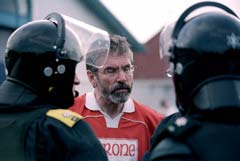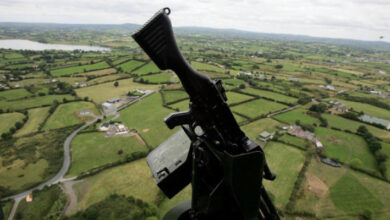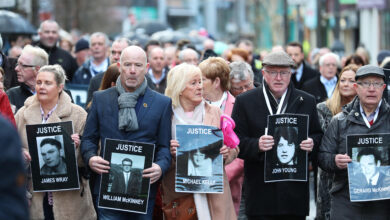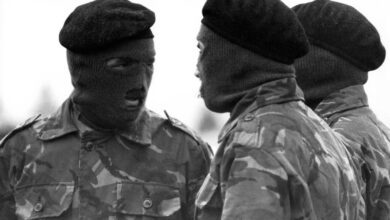Interview with Gerry Adams
From Belfast, Andrea Varacalli
Due to Sinn Féin’s election victory what steps are now required to revive the peace process?
There is now a huge onus on the British and Irish governments, but in particular on the British government, to drive forward with the full and faithful implementation of the Good Friday Agreement.
There is a small window available during which the two governments can assess whether the DUP is prepared to engage with the process positively and constructively. However, the continued suspension of the institutions by the British government cannot be sustained and is not tenable beyond a very short period.
Whatever the DUP does the two governments have responsibilities which they have to fulfil. I told Mr. Blair and Mr. Ahern this when I met them in Downing Street last Wednesday. The whole issues of rights, including equality and human rights, demilitarisation, policing, the Irish language and more has to be resolved. The governments made commitments in the Good Friday Agreement and in a Joint Declaration earlier this year, and in negotiations with us on all of these matters and it is now long past the time when these commitments should be honoured.
I have to say however that I left my meeting with Mr. Blair and Mr. Ahern deeply worried that the governments are not going to meet their obligations.
 What are your immediate concerns regarding the “no camp” within unionism now that it has gained electoral dominance?
What are your immediate concerns regarding the “no camp” within unionism now that it has gained electoral dominance?
Much has been made since about the rise of the Reverend Ian Paisley’s Democratic Unionist Party (DUP) which opposes the Good Friday Agreement and rejects the Agreement’s agenda for change. The increase in DUP support results directly from its ability to mop up all of the smaller anti-Agreement parties in the last Assembly.
The pro-Agreement unionist vote did not switch to the DUP. In fact over 70% of the electorate voted for pro-Agreement candidates and returned a majority of pro-Agreement members to the new Assembly.
Consequently the battle ground is now between those of us, unionists, republicans and nationalists, who are committed to the peace process and who want to advance the agenda of change, and those within the anti-agreement camp who want to turn the clock back.
Sinn Féin’s focus is on building a pro-Agreement axis. The two governments have an essential role. Essential to this will be the dialogue between Sinn Féin and the pro-Agreement Ulster unionist Party. Significant progress was made in these talks over the last six months.
So, we will continue to show positive leadership and engage in good faith with the two governments and the other parties. We recognise and respect the mandate of all parties, the DUP included. We are for dialogue and engagement. It is the DUP, which refuses to engage with Sinn Féin or in the political institutions.
In your opinion, did the reaction of David Trimble and the UUP to the IRAs in a recent act of decommissioning before the 28th July stastement push the unionist electorate into the arms of the DUP?
No. I believe that the UUPs tactical engagement with the peace process and especially with the institutions, which saw Mr. Trimble pull them down on at least four occasions over recent years, eroded unionist confidence in the Agreement and contributed to that party’s inability to maximise the pro-Agreement potential within unionism.
As I said in an earlier answer the DUP succeeded in winning all of the seats previously held by small anti-agreement unionists. What the UUP failed to do was motivate and take out the pro-Agreement vote on the unionist side. I hope this is a lesson now learned by the UUP.
 Do you believe that in West Belfast, as you stated on national television, that SDLP transfers aided the election of Diane Dodds or did republicans not voting affect this?
Do you believe that in West Belfast, as you stated on national television, that SDLP transfers aided the election of Diane Dodds or did republicans not voting affect this?
There are a number of aspects to the West Belfast vote which have to be looked at. The SDLP ran as an important part of their campaign a slogan “Stop the DUP”. It presented the DUP as the party on the unionist side to stand up for the unionist cause. This worked to the advantage of the DUP in unionist and loyalist areas and helped the Paisley party win significant transfers for the first time from the other unionist and loyalist parties. Some SDLP votes did transfer to the DUP.
While we succeeded in winning 7 of the 8 seats we had targeted in Belfast, emerging as the largest party in the city in the Assembly, we failed to maximise the potential Sinn Féin vote in the West of the city. Winning the fifth seat in a six seater constituency was never going to be easy but this election proved in can be done. We just have to work that little bit harder the next time.
What are the problems faced now by Sinn Féin entering a review of the Agreement and will it be possible to deliver the agreed outcome – that is a return of the devolved administration that was suspended by the Blair government?
We agreed a review of the Agreement when we negotiated it in 1998. But let’s be very clear, there can be no renegotiation of the Good Friday Agreement. That is our position and we make no bones about it. The principles, structures and obligations of that Agreement cannot and will not be subverted.
We are determined to see the Agreement implemented, and a new dispensation of peace and justice on this island.
Obviously in the discussions that will occur in the time ahead we will continue to press for the restoration by the British government of the institutions. It is that government which holds them in suspension. We have called for the lifting of this and we will continue to campaign for Mr. Blair to respect the election results and allow the Assembly to meet.
Was there a pre-agreed level of transparency in the latest act of IRA decommissioning with your unionist counterparts?
Republicans delivered fully on our part of the agreement which we had with the two governments and the unionists. It was Mr. Trimble who for his own reasons put the process on hold.
You compared the transition to a post conflict society as a journey. In what way can this journey through the battle of ideas achieve the desired outcome of changing mindsets and attitudes resulting in firm and sustainable relations between the Irish and British identities?
Steve Biko before his death at the hands of the apartheid regime in South Africa said, ïand I paraphrase his remarks; ïchange peoples ideas, change the way they think, and everything is possible’.
Look at the last 10 years, the last 5 years, and you can see tangible change taking place here. Governments wouldn’t talk to republicans – at least not openly and publicly. The Unionist Party wouldn’t negotiate, wouldn’t talk to us. All of that has changed.
We still have a long way to go. The battle of ideas is an ongoing, day by day challenge which requires tenacity and commitment. I believe that we are winning that battle; we are changing mindsets and the evidence of that is all around us.
On political analysis it is possible to see the structural similarities of Sinn Fein and the DUP. Both parties have along history of grass roots politics within the working class communities they receive their mandate from (also accepting the recent development of electoral strategy for both parties stretching beyond their working class platform to engage the more affluent voter). If one was able to remove the sectarian issues that divide these two sides could they be political allies.
In the local councils over the last two decades Sinn Fein Councillors have made common cause with Ulster Unionist Councillors, the SDLP, Alliance and DUP Councillors. There are issues and matters affecting our respective constituencies which we can work together on. Most recently Sinn Féin succeeded in persuaded the Ulster Unionist Minister Reg Empey to establish a Task Force to look at West Belfast and produce a plan which could tackle the multiple problems affecting all of the people of this constituency – unionist and nationalist. Sinn Féin representatives worked closely with unionists and loyalists to produce a programme of work which has the potential of achieving real progress and real improvements.
At its core the DUP is a sectarian party. That remains its raison d’etre.
Can you see in your lifetime Sinn Féin ever leaving this name behind to take on a form more acceptable to unionism?
Changing a name without changing the politics of the party would be deceitful. And we have no intention of abandoning our Irish republicanism to become unionists!
We are in the business of talking with unionists and we want to understand them better and to try and take account of their concerns and fears for the future but in the battle of ideas we are Irish republicans. We want a united Ireland. We believe that an Ireland independent of Britain, in which the people are sovereign, and where citizens are treated on the basis of equality, is the way forward.
Pearse said- “If we today are fighting for something either greater than or less than the thing our fathers fought for, either our fathers did not fight for freedom at all or we are not fighting for freedom”.
Can the fight be justifiably stronger armed with political ideas or armed with bullets; and how do you see today the double strategy adopted by ETA in Euskal Herria.
The men and women who rose in rebellion in 1916 or who fought the British during the Tan War or at other times during the many centuries of Britain’s colonial occupation of Ireland, used the resources and tactics and strategies which they believed best met their needs and could secure their objectives as basques today trying to do.
In this generation Sinn Féin has developed a peace strategy which we believe can achieve our political goals. The IRA had courageously taken initiatives to enhance that strategy and the peace process that emerged from it.
I believe that this generation will be the one which finally, successfully concludes Ireland’s long struggle for freedom.
Do you feel that your contribution to peace in the North of Ireland should have been recognised alongside that of your colleagues John Hume and David Trimble when they received the 1998 Nobel Peace Prize.
I’m not interested in awards. I am interested in making this process work. If we succeed in that, that will be reward enough





